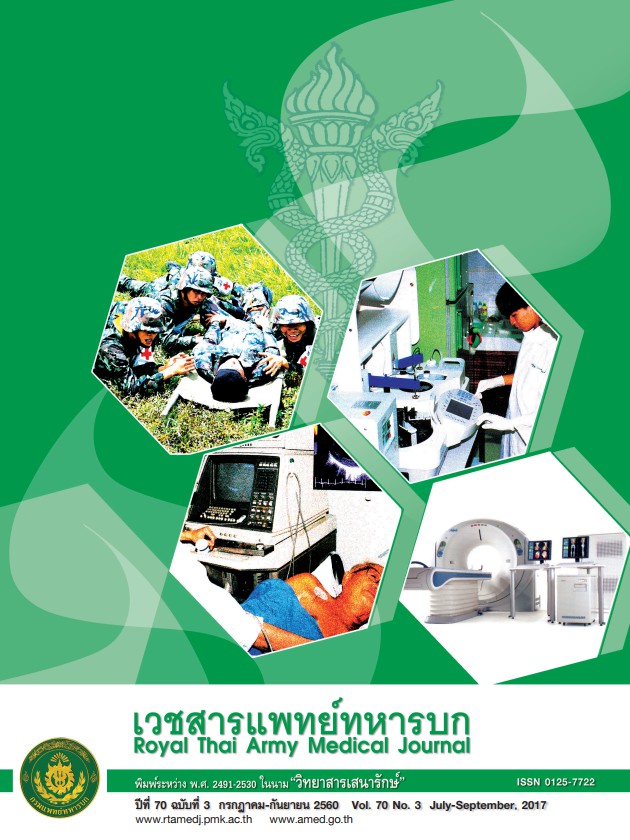การสำรวจหน้าที่ของเภสัชกรในหน่วยบริการปฐมภูมิ
Main Article Content
บทคัดย่อ
ความเป็นมา การศึกษาเชิงสำรวจหน้าที่ของเภสัชกรในหน่วยบริการปฐมภูมินี้เป็นข้อมูลเบื้องต้นสำหรับใช้เป็นแนวทางในการพัฒนางานเภสัชกรรมปฐมภูมิเนื่องจากปัจจุบันหน้าที่ของเภสัชกรในหน่วยบริการปฐมภูมิยังไม่ชัดเจนประกอบกับยังไม่มีการกำหนดแนวทางในการปฏิบัติงานให้เป็นทิศทางเดียวกัน วัตถุประสงค์ เพื่อสำรวจหน้าที่ คุณสมบัติที่จำเป็น ปัจจัยที่มีผลในการปฏิบัติหน้าที่ของเภสัชกรและความคาดหวังในการพัฒนางานเภสัชกรรมปฐมภูมิ วิธีการศึกษา เป็นการศึกษาเชิงพรรณนา จากเภสัชกรที่ปฏิบัติงานในหน่วยบริการปฐมภูมิของรัฐในประเทศไทยและมีรายชื่อปรากฎตามที่ลงทะเบียนไว้กับสำนักงานหลักประกันสุขภาพแห่งชาติทั้งหมด 457 คน โดยส่งแบบสำรวจทางไปรษณีย์ ผลการศึกษา พบว่าได้รับการตอบกลับทั้งหมด 217 คนคิดเป็นอัตราการตอบกลับร้อยละ 47.48 เภสัชกรมีการปฏิบัติหน้าที่ส่วนใหญ่ใกล้เคียงมาตรฐานที่กำหนดในคู่มือสำหรับเภสัชกรในการดำเนินงานในหน่วยบริการปฐมภูมิ ยกเว้นในส่วนการจัดเก็บ ควบคุมรักษายาและเวชภัณฑ์ฏิบัติในระดับน้อยไม่เพียงพอสำหรับหน่วยบริการปฐมภูมิ และมีบางหน้าที่ยังไม่มีการปฏิบัติได้แก่ การจัดกองทุนยา การสร้างเครือข่ายดูแลผู้ป่วย การกระจายยาสามัญประจำบ้านในชุมชนและการสนับสนุนให้มีการปลูกและกระจายพันธุ์ของสมุนไพร โดยปัจจัยด้านจำนวนเภสัชกรมีผลมากที่สุดสำหรับงานบริหารเวชภัณฑ์และงานส่งมอบให้คำแนะนำการใช้ยา และปัจจัยด้านการมีทัศนคติที่ดีต่องานมีผลมากที่สุดสำหรับงานจัดระบบดูแลต่อเนื่องดำนยาในชุมชน งานคุ้มครองผู้บริโภคและงานส่งเสริมการพึ่งพาตนเองด้านสุขภาพและสมุนไพร สรุป เภสัชกรส่วนใหญ่มีความคิดเห็นว่าควรพัฒนางานจัดระบบดูแลต่อเนื่องด้านยาในชุมชนและการสื่อสารกับบุคลากรทางการแพทย์มากที่สุด
A Survey of Pharmacist’s Responsibilities in Primary Care Unit
Background: This survey study of pharmacist role in the primary care units (PCU) is the basic information for guidance of pharmacist in order to develop pharmaceutical works in the PCU because there is unclear on pharmacist’s responsibilities in the PCU and there is no consistent direction of pharmaceutical work. Objective: The purposes of this study were to survey responsibilities, characteristics, factors affecting the performance of pharmacist duties and expectations in development of pharmacist roles in the PCU. Methods: This study surveyed 457 pharmacists who had been working in the PCU of the state of Thailand and they were in the list of the National Health Security Office. Questionnaires were sent to these pharmacists in the PCU by mail. Result: Questionnaires were received back 217 responses, representing a response rate of 47.48 percent. Mostly, pharmacist’s responsibilities for the PCU were resembled to the standards in the pharmacy manual for operations in the PCU. However, most of pharmacist practiced less in storage and control of medical products. Interestingly, some roles including medical fund management, patient service network, distribution of first-aid items to community, as well as, encouraging people in community to cultivate herb and distribution to community had been no performing in the PCU. In addition, the most important factor affecting to the delivery and advising the use of medicine and medical product management was inadequate of pharmacists. The factor affecting to the continuous medicinal care in the community, the public health consumer protection and promoting self-sufficiency of health and herb was positive attitude to the responsibilities. Conclusion: The most expectations of the pharmacist in development of pharmacist roles in the PCU improvement of the continuous medicinal care in the community and communication with other healthcare professionals.
Downloads
Article Details
บทความในวารสารนี้อยู่ภายใต้ลิขสิทธิ์ของ กรมแพทย์ทหารบก และเผยแพร่ภายใต้สัญญาอนุญาต Creative Commons Attribution-NonCommercial-NoDerivatives 4.0 International (CC BY-NC-ND 4.0)
ท่านสามารถอ่านและใช้งานเพื่อวัตถุประสงค์ทางการศึกษา และทางวิชาการ เช่น การสอน การวิจัย หรือการอ้างอิง โดยต้องให้เครดิตอย่างเหมาะสมแก่ผู้เขียนและวารสาร
ห้ามใช้หรือแก้ไขบทความโดยไม่ได้รับอนุญาต
ข้อความที่ปรากฏในบทความเป็นความคิดเห็นของผู้เขียนเท่านั้น
ผู้เขียนเป็นผู้รับผิดชอบต่อเนื้อหาและความถูกต้องของบทความของตนอย่างเต็มที่
การนำบทความไปเผยแพร่ซ้ำในรูปแบบสาธารณะอื่นใด ต้องได้รับอนุญาตจากวารสาร


